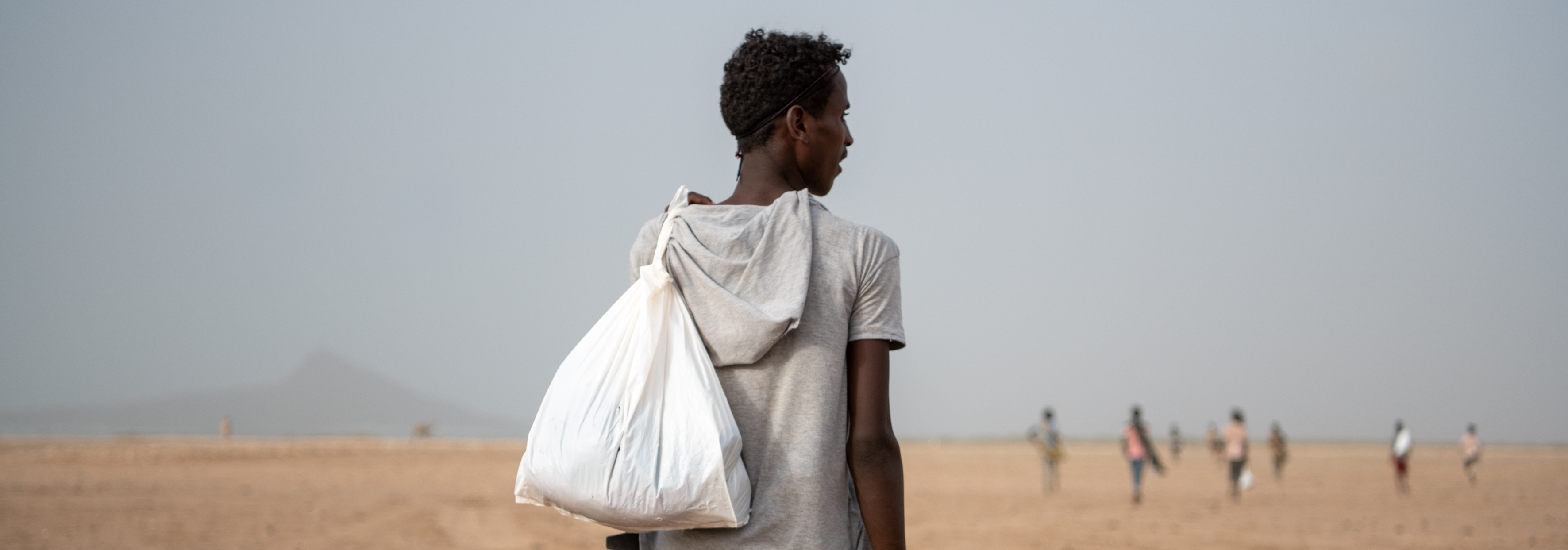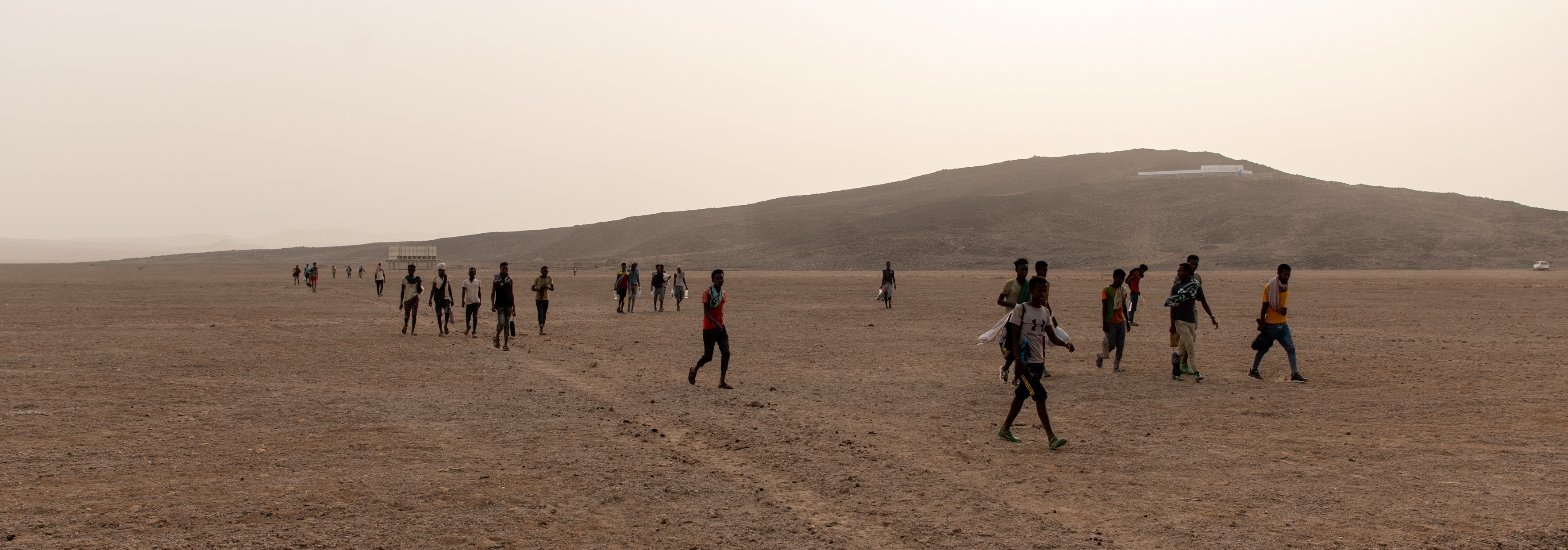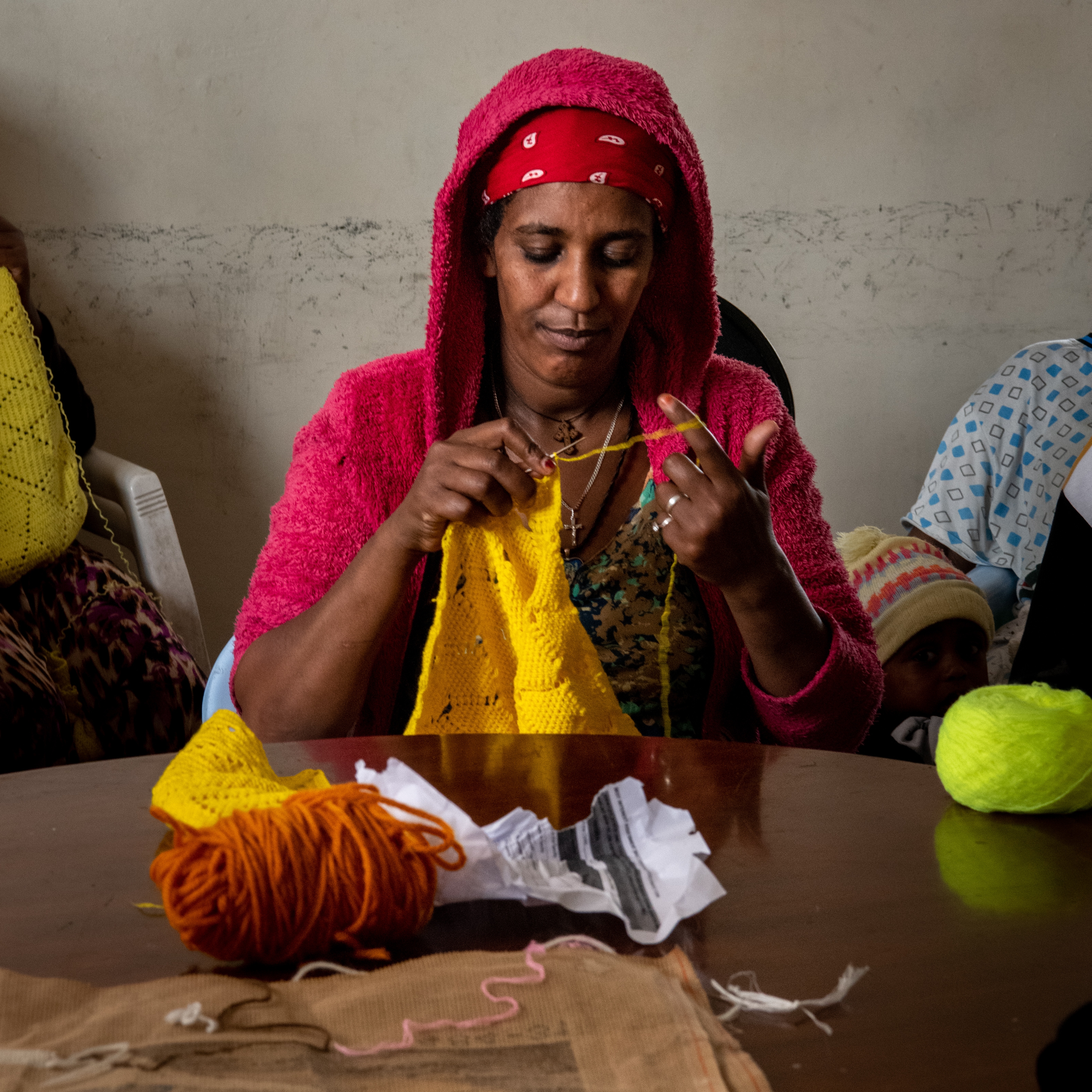IOM Vision
The Regional Migrant Response Plan (MRP) for the Horn of Africa and Yemen includes urgent life-saving humanitarian and protection interventions to improve safe and dignified access to basic services for migrants in transit, destination as well as host communities, ensuring medium to long-term actions aimed at addressing the drivers of migration; as well as building evidence, partnerships and coordination to enhance the humanitarian response and migration management throughout the migration route. Within the broader inter-agency framework developed by IOM in coordination with 40 partners, including regional and country-level non-governmental (NGOs), UN Agencies and intergovernmental partners, IOM will support governments and other partners by strengthening their capacities for better migration management to support communities of origin, transit and destination.
Objective
Saving lives and protecting people on the move
|
The beneficiaries within this objective, include migrants and host communities assisted with life-saving assistance and protection, and government officials benefiting from training and technical assistance related to humanitarian assistance and protection. The migrants require assistance at key transit points and in the communities they settle, as they transit often on foot and in remote desert areas, with minimal economic resources. In Ethiopia the considerable caseload of returning migrants, including forcibly returned migrants from the Kingdom of Saudi Arabia as well as migrants assisted by voluntary humanitarian return (VHR) from Yemen arriving in Addis Ababa, has resulted in overcrowding and delayed returns to places of origin; resulting in dire need for life-saving assistance and tailored protection assistance. |
|
IOM will provide basic humanitarian assistance to vulnerable migrants, including stranded migrants, UMCs, GBV survivors and victims of human trafficking, and this assistance will be provided in the Migration Response Centres (MRCs), Migration Response Points, Ethiopian Community Centres (ECC), government shelters, way stations and other centres providing services to migrants. IOM will provide food and/or nutrition assistance to vulnerable migrants in coordination with the World Food Programme (WFP), a key MRP partner. Specifically, IOM will:
|
|
IOM will provide integrated essential health and nutrition services to migrants and crisis-affected populations along the Eastern Route. IOM will also refer migrants to primary health care or secondary health care (including specialist clinics/services such as cardiology, physiotherapy, etc.) along the Eastern Route. Key activities will include:
|
|
Many migrants suffer from mild to severe psychosocial trauma and require Psychological First Aid (PFA) upon arrival, as well as assessments and referrals for the most severe cases to specialized service providers for MHPSS. In 2023, IOM will provide MHPSS activities in line with the IOM Manual on Community-Based MHPSS in Emergencies and Displacement to maintain their mental health, improve their psychosocial well-being and strengthen the protection environment for migrants and affected communities. MHPSS activities will include skills training, MHPSS training for officials and actors involved in the Eastern Route, training of trainers for migrants on peer counselling and information-sharing, and establishing a buddy system for returnees (Ethiopia). The buddy system leverages well-integrated returnees in hotspots of return to create peer-to-peer support systems for incoming returnees. The focus will include the following activities:
|
|
Transiting migrants face increased barriers to accessing essential services, deteriorating living conditions, the harsh climate, exposure to human rights violations including but not limited to monetary extortion, physical assault, torture, sexual violence and abuse by smugglers as well as being exposed to risks of human trafficking. Migrants end up stranded in countries of transit and destination as they lack the financial means to either continue their journey and/or return home. As such, VHR constitutes an immediate life-saving option to assist migrants with voluntary and dignified returns to their countries of origin for those who wish to return and have no means to do so. To enable migrants, stranded in vulnerable situations in Yemen, Djibouti and Somalia, to reach their communities of origin safely movement assistance activities that will be undertaken by IOM are set out below:
|
|
The portfolio of protection activities will cover MRCs, health clinics, mobile teams, way stations and child protection desks in each country. In addition, IOM will provide specialized protection and GBV services to victims of trafficking, at-risk migrants, protection services for victims of human rights violations, rape survivors, and UMCs; family tracing and reunification; and hotlines to provide information on protection services (Yemen). In terms of rape survivors, IOM will target migrant survivors and aim to provide clinical services or rape services within 72 hours of an incident or exposure. IOM will also conduct protection monitoring and vulnerability assessments, and document cases of migrant deaths or disappearances. In addition, IOM will provide training to government officials, front-line actors, partners and border management officials on child protection, GBV, counter-trafficking, identification of special needs, referral mechanisms for vulnerable migrants, and human rights. In Yemen, IOM will continue to engage and include de-facto authorities in the aforementioned capacity-building initiatives despite being unrecognized internationally to reach the most vulnerable migrants. In summary, IOM activities under the activity area will include:
|
|
IOM will implement WASH activities, including providing services and rehabilitation of infrastructure. Specific activities will encompass the following:
|
|
IOM will provide safe and dignified accommodation assistance (through transit centres, MRCs, and provision of transitional shelters) and shelters offering specialized protection services. IOM will provide NFIs in the Eastern Route countries, targeting returning migrants in Ethiopia and Somalia and transiting migrants in the other MRP countries. IOM will:
|
Under Humanitarian Border Management, IOM will:
- Establish or improve national or cross-border referral mechanisms for vulnerable migrants, as well as improve border and migration management processes, harmonize policies and procedures and bolster the advocacy, coordination, development, and implementation of action plans to address the needs of migrants along the eastern route and other migratory routes.
- Partnership and coordination at regional, national, and local levels is a cross-cutting theme underpinning all proposed measures to enhance the complementarity of action between different actors and ensure consistency and predictability in operationalizing responses against agreed milestones. This may include, but is not limited to, cross-border referral mechanisms for UMCs and GBV survivors between MRP partners and agencies mandated to protect people in mixed flows.
- Pilot a border pass system at two selected border crossing areas in Ethiopia.
- Strengthen the structures and procedures for enhanced humanitarian border and immigration management, such as through the provision of trainings for border officials on rights based and humanitarian approach to border management, operationalization of context specific SOPs, the promotion of migrants’ human rights at borders, the donation of equipment and materials, and the rehabilitation of border posts.

Objective
Driving solutions to displacement
|
Target beneficiaries within this objective include mainly migrants and host communities in countries comprising the Eastern Route. In Ethiopia, as the main departure country for migrants, communities with high levels of emigration and returns remain the priority for awareness-raising campaigns to provide information on the risks of irregular migration. In Somalia and Yemen, vulnerable and returnee migrants are the focus of this objective to mitigate considerable protection risks due to the protracted conflicts. In Somalia, this will include community stabilization and community reintegration initiatives. In Yemen, this will consist of awareness-raising campaigns, and establishing and strengthening community-based protection structures. Similarly, communities involved in the conflict in Northern Ethiopia will be targeted for community stabilization activities to bolster the truce recently established between conflict actors. Lastly, host community members and migrants within communities affected by the Horn of Africa drought and other climate-related impacts will be targeted with sustainable livelihoods to address the longer-term implications of displacement. IOM's drought-related response is outlined in the regional drought response plan. |
|
Along the Eastern Route, the drivers for irregular migration continue to be primarily economic, and areas of outward migration are often marked by communities with weak social cohesion, poor service delivery and weak governance. Stranded migrants and returnees need more sustainable solutions to mitigate the risk of unsafe and irregular migration or further marginalization. This includes community-based initiatives that foster stabilization and resilience through access to quality basic services, sustainable and climate-resilient livelihoods, and other initiatives that address the needs of at-risk, vulnerable groups. The community stabilization activities will seek to assist governments, civil society and affected communities to reduce the drivers of forced and irregular migration, strengthening community cohesion efforts, finding durable solutions for stranded migrants and facilitating safe return options to Ethiopia and Somalia. Following are the other key community stabilization activities:
|
Objective
Contribute to an evidence-based and efficient crisis response system
|
Key entities and people targeted within this category include humanitarian and development actors, regional and sub-regional governing bodies, national government ministries, and other entities involved in migration management, including border management officials and healthcare entities. IOM aims to contribute to an evidence base covering migration dynamics along the Eastern Route. Examples of the governing bodies covered under this objective include Ethiopia’s NPC, and federal and regional law enforcement government officials. Facilitating meetings with and among governing bodies aims to improve policies impacting migration. In addition, communication products under this objective also target the above audience to advocate for Eastern Route migrants. |
|
Displacement tracking activities will include flow monitoring registry reports (FMR), flow monitoring surveys (FMS) and needs assessments in Djibouti, Ethiopia, Somalia, and Yemen. Flow monitoring reports in 2023 will be formulated with data collected from Flow Monitoring Points (FMP) monthly through the registration of migrants crossing border points and surveys (FMR and FMS). The reports will include information about the volumes of migrants, their nationalities, sex and age disaggregated information, their origins, their planned destinations, COVID-19 monitoring indicators and key vulnerabilities, among others. More specifically, IOM will:
|
|
IOM will focus on enhancing the capacities of local actors to respond through capacity development, including training and operational support to local NGOs and other responders. Specific support services for response actors will include:
|
Yemen, Somalia, Djibouti, Ethiopia
The map used here is for illustration purposes only. Names and boundaries do not imply official endorsement or acceptance by IOM.
Figures are as of 31 December 2023. For more details of IOM's operational capacity in country, please see the IOM Capacity section.













